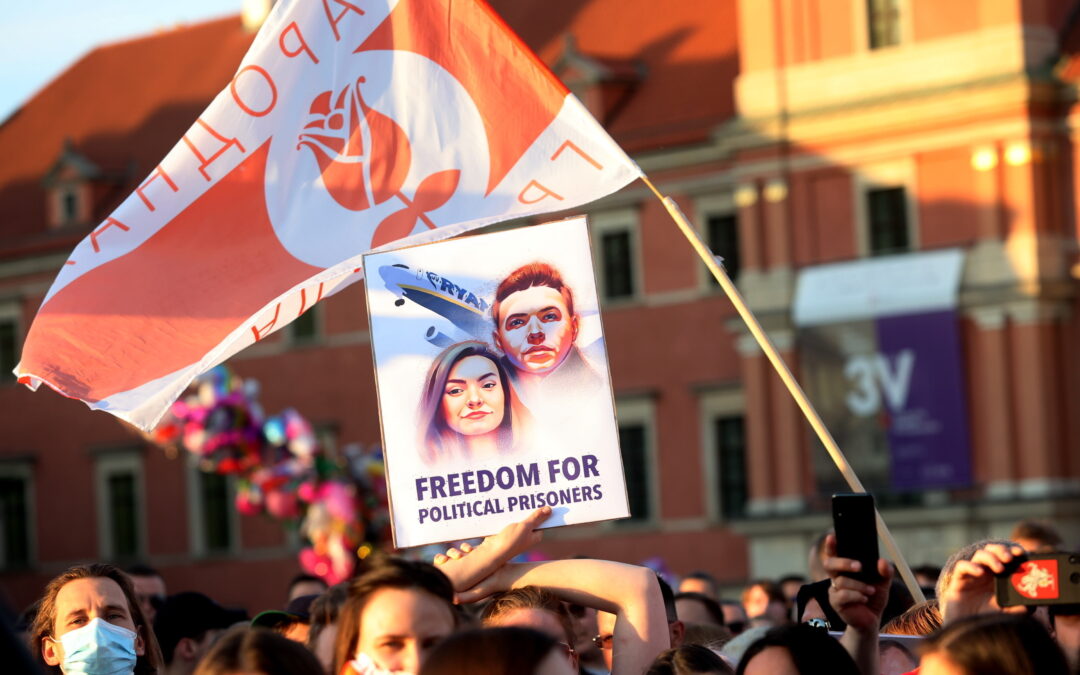Poland has presented the findings of its investigation into the forced landing of a Ryanair flight in Belarus in May, during which an opposition activist was detained by the Belarusian authorities. “It can be interpreted as an act of state terrorism,” concludes the Polish report.
“The hijacking of the plane was a deliberate action by the regime; it served to detain [President Alexander] Lukashenko’s political opponents,” said Stanisław Żaryn, spokesman for the Polish security services.
The findings follow a report in the New York Times yesterday stating that a Belarusian air traffic controller fled to Poland earlier this year and has since been providing information to the Polish security services.
"One man who slipped furtively into Poland across the border with Belarus received a warm but top-secret welcome.
An air traffic controller has been telling Polish investigators what he knows about the diversion of the plane carrying a dissident in May" https://t.co/s9Qtw6sfyW
— Notes from Poland 🇵🇱 (@notesfrompoland) December 8, 2021
The flight, which was en route from Athens to Vilnius on 23 May, was diverted to land in Minsk by the Belarusian authorities, who claimed there had been a bomb threat. While it was on the tarmac, two passengers – Belarusian journalist Roman Protasevich and his Russian girlfriend, Sofia Sapega – were detained.
The Polish investigation, however, noted that flight crew were informed by the Belarusian authorities of the alleged bomb threat around half an hour before the email containing the threat – purportedly from Hamas – had reached them.
Once the plane – which was operated by Buzz, a Polish subsidiary of Ryanair – had landed in Minsk, the “behaviour of the emergency services and airport staff indicated that there was no [bomb] threat”, notes the Polish report.
“The evacuation of passengers was carried out in an unhurried manner and the search of potentially dangerous luggage was conducted in the immediate vicinity of the aircraft,” which was positioned near the airport terminal where bystanders were present, said Żaryn, quoted by Interia.
The Polish findings also indicate that, during the incident, a Belarusian KGB officer was present in the operations room of the air traffic control tower, and “at a key moment took control over [its] work”. He was constantly reporting back to someone by phone on the course of events.
“The evidence collected clearly shows that there was no bomb threat and the entire operation was provoked by the Belarusian side in order to mislead the crew and persuade them to land in Minsk,” he added. “It was a planned operation by the Belarusian security services.”
The entire operation “can be interpreted as an act of state terrorism,” concludes a video presentation of the findings presented today. These words echo those used by Poland’s prime minister immediately after the incident in May, which he called an “act of state terrorism” that “cannot go unpunished”.
Poland’s government has been a prominent international supporter of the democratic opposition in Belarus since protests broke out last year in response to Lukashenko’s claimed re-election amid widespread evidence of vote-rigging.
Protasevich himself was one of many Belarusian activists to have sought refuge in Poland, though he later moved on to Lithuania before Polish authorities had processed his claim for asylum.
After being detained, Protasevich appeared on Belarusian state television, where he praised Lukashenko and confessed to organising anti-government protests. His family, Belarusian opposition activists, and experts say that the confession was clearly coerced, likely under torture. He remains in Belarus.
Relations between Warsaw and Minsk have further soured this year due to a migration crisis orchestrated by the Belarusian authorities. The Polish government says that the operation has been undertaken in part as revenge against Poland for supporting the Belarusian opposition.
Main image credit: Kuba Atys / Agencja Gazeta

Daniel Tilles is editor-in-chief of Notes from Poland. He has written on Polish affairs for a wide range of publications, including Foreign Policy, POLITICO Europe, EUobserver and Dziennik Gazeta Prawna.




















